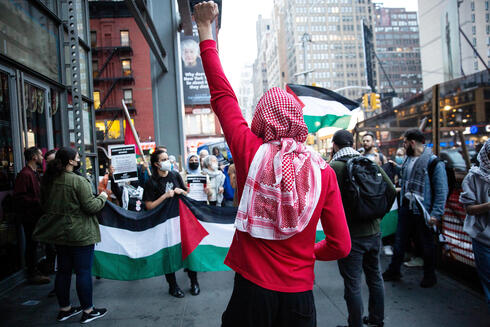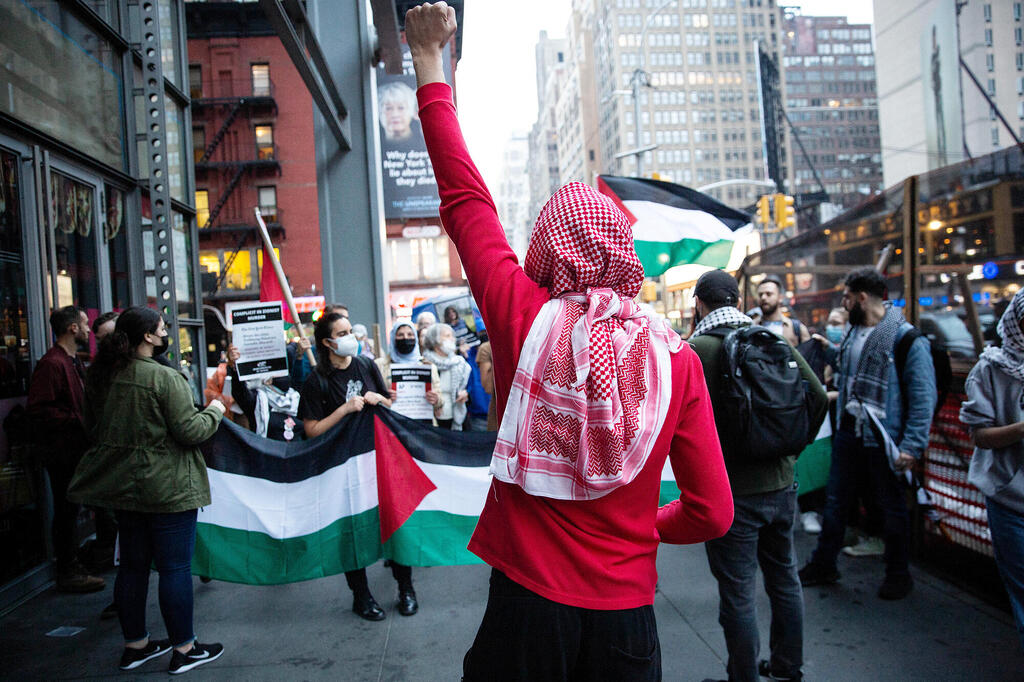
Human Rights Watch report accusing Meta of censoring pro-Palestinian posts is riddled with serious failures
A report by HRW published last week claimed that "Meta’s policies and practices have been silencing voices in support of Palestine and Palestinian human rights on Instagram and Facebook." However, an examination by Calcalist identifies biases in the collection of data and in the method of analysis, in a way that undermines the foundation of the organization's conclusions
Has Meta consistently censored pro-Palestinian posts on Facebook and Instagram since the war broke out on October 7? This is the claim that is at the center of an extensive report by the human rights organization Human Rights Watch (HRW), which was published last Thursday and received significant coverage in major media outlets across the world. However, an examination by Calcalist identifies serious biases in the organization's data collection and analysis, in a way that undermines the foundation of the organization's conclusions.
According to HRW, during October and November it reviewd 1,050 cases, 1,049 involved "peaceful" content in support of Palestine that HRW says "was censored or otherwise unduly suppressed," while one case involved removal of content in support of Israel. The documented posts were posted by users from more than 60 countries, most of them in English, and all were described as expressing "peaceful" support for the Palestinians expressed in various ways. "The censorship of content related to Palestine on Instagram and Facebook is systemic and global," claims HRW in the report it published. "Meta’s inconsistent enforcement of its own policies led to the erroneous removal of content about Palestine."
The organization's findings received international attention, and their highlights were published in leading and influential media such as CNN, Forbes, The Guardian and El Pais. However, the organization's data collection and data analysis methodology suggests that HRW's conclusions rest on an unreliable foundation.
First, this type of analysis done by the organization should be based on a large representative sample of posts from both sides of the conflict, which will include content that was removed alongside content that was not removed and present a statistical analysis that will examine the proportion of justified removals alongside the proportion of cases in which infringing content was not removed both in relation to pro-Palestinian posts and pro-Israeli posts. And this, on the basis of well-defined, clear and transparent standards.
Such a study is not easy to carry out, because Meta does not in principle make accessible information that can be edited. In addition, the methodology that the HRW researchers chose to apply is very problematic. Instead of developing a method for independent collection of posts, the organization chose to base itself on a public appeal to the public to report by email cases in which Meta censored content that did not deserve to be censored.
The very choice of this method produces a clear bias in favor of emphasizing censorship of pro-Palestinian publications, for several reasons: first, understandably, users will not report posts that have been removed because they expressed support for violence, calls for harm to innocents or included graphic and violent content, and will also tend to report posts removed for no good reason in their opinion. As a result, the answers that will be received in response to the request will be distinctly biased in favor of posts that Meta apparently should not have removed.
In response, the organization received reports of 1,285 posts that were removed, and disqualified 235 of them for a variety of reasons, including the impossibility of establishing a claim for censorship, the lack of connection to Israel or Palestine, or content that incites discrimination, violence, etc., and whose disqualification is justified. It can be assumed, with a high level of certainty, that the volume of violent and inciting content removed on Facebook and Instagram is significantly higher than 18% at most of all content that is removed, and therefore the method underlying the methodology creates a problematic bias in favor of content that should not have been removed, even if the scope of their removal may be relatively small.
Second, the pro-Palestinian audience is significantly larger than the pro-Israeli audience, a direct result of the number of Muslims in the world compared to the number of Jews. Therefore, social media has more pro-Palestinian posts to begin with and also the number of referrals from pro-Palestinian users whose posts have been removed will be greater. A greater number of removals of pro-Palestinian posts does not indicate more significant censorship compared to pro-Israeli posts, and the relevant figure is the proportion of seemingly unjustified removals out of all the posts published - a figure that the organization does not attempt to find out. That is, to begin with, there are more pro-Palestinian users whose posts were removed than pro-Israeli users, even if Meta's attitude to both sides is the same, and there are more such users who will contact HRW on the issue.
This built-in bias is aggravated by two significant factors. The first, the identity of the organization itself. Whether rightly or wrongly, HRW is seen among the Israeli public as a distinctly anti-Israel and pro-Palestinian organization, and as a sharp and significant critic of the State of Israel and its policies. This very perception prevents many Israelis and supporters of Israel from cooperating with the organization, and on the other hand encourages Palestinians and their supporters to cooperate with it.
Second, and more seriously, the way in which the organization appealed to the public with a request to transfer evidence for the purpose of the research is clearly biased in order to receive information from pro-Palestinian users. The organization published applications in Arabic, English and Hebrew. However, while the references in English and Arabic were published on Instagram, TikTok and X (formerly Twitter), the reference in Hebrew was published on X only. X is a declining platform, and to begin with its penetration in Israel is extremely low. Instagram and TikTok, on the other hand, are platforms that are booming and especially popular among young users, who, according to recent surveys, are more inclined to support the Palestinians. It is not clear, for example, why the organization did not publish a similar appeal, in all languages, also on Facebook - a platform not only with a very significant penetration in Israel but also one with an older audience, which shows relatively greater support for Israel.
The organization reached out in advance on platforms that are more likely to find pro-Palestinian users, completely ignored a popular platform in Israel that is more likely to be used by supporters of Israel, and made an appeal in Hebrew only on a platform with low penetration in Israel, the scope of which is decreasing. These choices, most likely, had a significant impact on the findings collected by the organization and created another bias in favor of a conclusion of pro-Palestinian censorship.
It is not surprising, therefore, that of the 1,050 posts included in the study, only one expressed support for Israel (an Instagram post that read "There is no ceasefire until all the abductees are brought home. There is no ceasefire until Hamas is destroyed. Israel has the right to defend itself. The Palestinians have the right to be free from Hamas oppression"), and that no post received by the organization was written in Hebrew.
Along with the problems in the organization's information collection methodology, problems in the data analysis itself must also be considered. Thus, for example, HRW sees fit to criticize Meta's dangerous organizations and individuals policy, which prohibits not only the activity of these organizations and their members on its platforms, but also the publication of words of praise and support for these organizations. This list of organizations, which is based on the U.S. list of terrorist organizations, naturally includes Hamas - a terrorist movement as bad as ISIS or al-Qaeda. However, according to HRW, Hamas is "a political movement with a military arm", and Meta’s policy in relation to it “bans in practice many posts that support Palestinian political movements."
Where Meta and any sane person sees Meta banning an organization supporting a body that carried out one of the most brutal attacks in history perpetrated against a civilian population, HRW sees a ban on expressing support for a legitimate political movement as a whole, with some military arm that needs to be scolded. In the report itself, the organization does not specify the contents of the posts dealing with Hamas that were removed, and only states that "neutral references to Hamas were also removed", without saying how it itself cataloged posts supporting Hamas.
The organization further claimed that taking down posts that included the phrase "From the river to the sea, Palestine will be free", which is understood by many as a call for genocide against Israelis and the destruction of the State of Israel, is not justified and amounts to improper censorship ("the words in each of these statements on their face do not constitute incitement to violence, discrimination, or hostility"). A claim that, at the very least, can be considered controversial.
Suspiciously, the report talks about cases in which Meta did not remove pro-Israel posts that in its opinion should have been removed, such as a comment on Instagram that calls for "Make Gaza a parking lot", or a comment in which a writer calls to "wipe Palestine off the face of the earth and the map". For some reason, the organization was unable to find any similar pro-Palestinian post that was not removed by Meta.
The report also documents quite a few cases of clearly unjustified removals, such as posts that included the phrases "ceasefire now", "stop the genocide", or even just an emoji of the Palestinian flag. However, there is quite a bit of evidence for similar unjustified removals of pro-Israeli posts.
In a huge and complex system like Facebook and Instagram, it is almost impossible to avoid wrongful removals of appropriate content, and this is a failure that affects users on both sides and of course it can also be identified in other areas. HRW's claim that Meta's censorship is disproportionately directed against pro-Palestinian posts is based on problematic, not to mention fundamentally flawed, collection and analysis methodologies, and does not meet the basic burden of proof.














